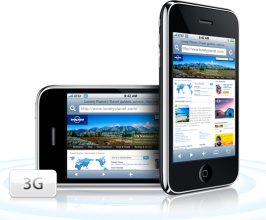 One of the most controversial issues surrounding the iPhone since its introduction last year has been Apple's policy requiring service providers to share revenue in exchange for the privilege of selling the phone. The has led to the exclusive deals signed in each of the 6 countries where the phone is officially available. With the introduction of the iPhone 3G that appears to be changing - for new markets anyway.
One of the most controversial issues surrounding the iPhone since its introduction last year has been Apple's policy requiring service providers to share revenue in exchange for the privilege of selling the phone. The has led to the exclusive deals signed in each of the 6 countries where the phone is officially available. With the introduction of the iPhone 3G that appears to be changing - for new markets anyway.
A filing yesterday with the US Securities and Exchange Commission says:
"Apple has signed multi-year agreements with carriers authorizing them to distribute and provide network services for iPhones in over 70 countries. These agreements are generally not exclusive with a specific carrier, except in the United States, United Kingdom, France, Germany, Spain, Ireland, and certain other countries. Under the vast majority of these agreements, Apple will not receive follow-on revenue generating payments from carriers for the new iPhone 3G beyond the purchase of the device by carriers or a commission on sales of the device by Apple. Apple will continue to receive payments from cellular network providers related to first-generation iPhones as long as they remain active on authorized networks."
In other words Apple won't be collecting a portion of subscriber fees for the new iPhone as it's introduced into new markets, but existing agreements will remain in effect. If you're in a country like the US where there's already an exclusive provider that won't be changing any time soon.
Combined with comments from Steve Jobs when he introduced the iPhone 3G yesterday it would seem to indicate a general lack of interest for Apple's revenue sharing plan among mobile phone providers worldwide. In fact he said Apple's original goal was to expand into just 6 more countries with the new iPhone. To call that conservative after the elimination of revenue sharing is an understatement.
It seems more likely that the change of heart resulted from an inability to find 6 more providers interested in Apple's business model.
"Apple has signed multi-year agreements with carriers authorizing them to distribute and provide network services for iPhones in over 70 countries. These agreements are generally not exclusive with a specific carrier, except in the United States, United Kingdom, France, Germany, Spain, Ireland, and certain other countries. Under the vast majority of these agreements, Apple will not receive follow-on revenue generating payments from carriers for the new iPhone 3G beyond the purchase of the device by carriers or a commission on sales of the device by Apple. Apple will continue to receive payments from cellular network providers related to first-generation iPhones as long as they remain active on authorized networks."
In other words Apple won't be collecting a portion of subscriber fees for the new iPhone as it's introduced into new markets, but existing agreements will remain in effect. If you're in a country like the US where there's already an exclusive provider that won't be changing any time soon.
Combined with comments from Steve Jobs when he introduced the iPhone 3G yesterday it would seem to indicate a general lack of interest for Apple's revenue sharing plan among mobile phone providers worldwide. In fact he said Apple's original goal was to expand into just 6 more countries with the new iPhone. To call that conservative after the elimination of revenue sharing is an understatement.
It seems more likely that the change of heart resulted from an inability to find 6 more providers interested in Apple's business model.












